人教版(2019)必修第一册Welcome Unit Discovering Useful Structures 课件(共63张PPT)
文档属性
| 名称 | 人教版(2019)必修第一册Welcome Unit Discovering Useful Structures 课件(共63张PPT) |
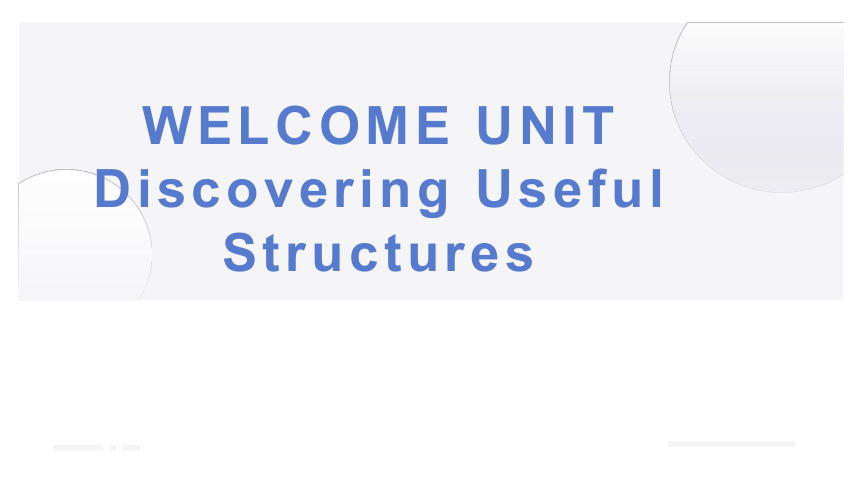
|
|
| 格式 | pptx | ||
| 文件大小 | 2.0MB | ||
| 资源类型 | 教案 | ||
| 版本资源 | 人教版(2019) | ||
| 科目 | 英语 | ||
| 更新时间 | 2023-12-14 00:00:00 | ||
图片预览

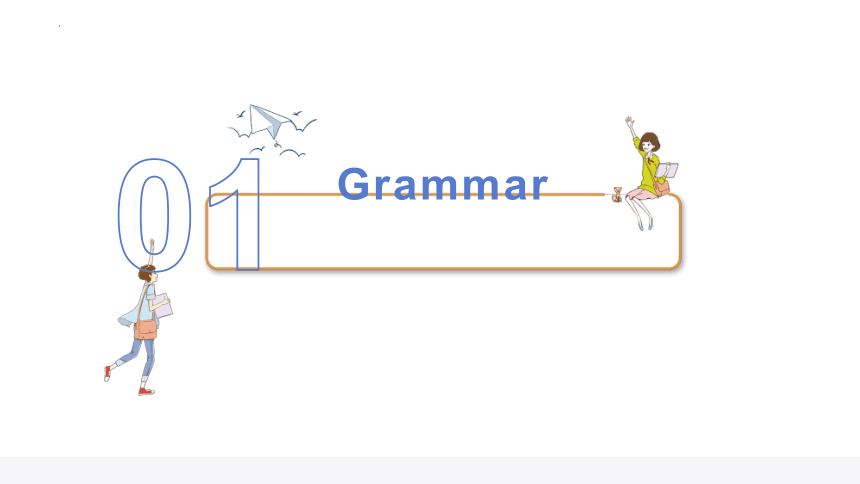
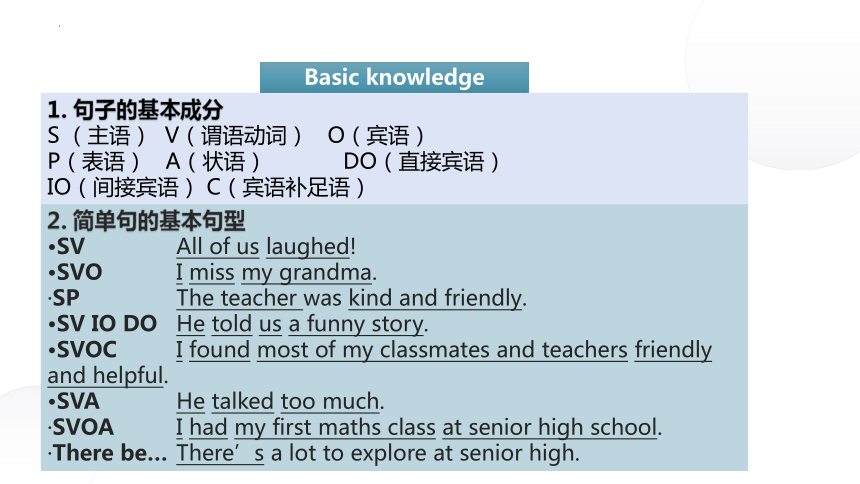
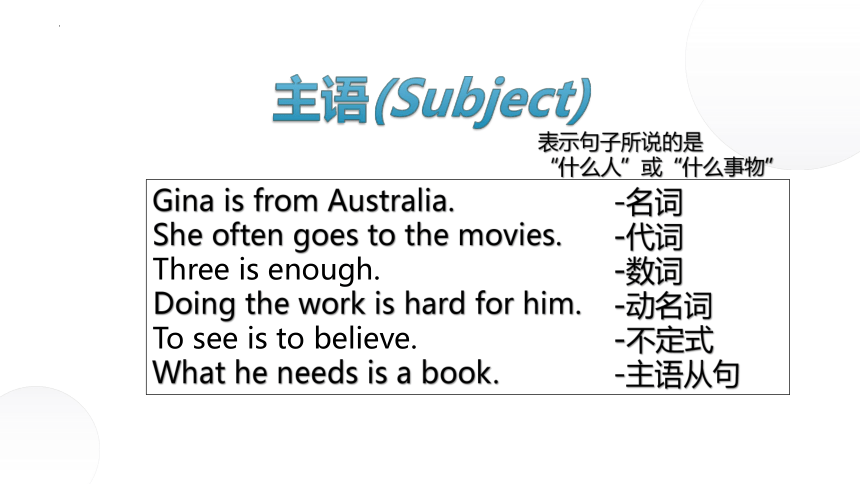
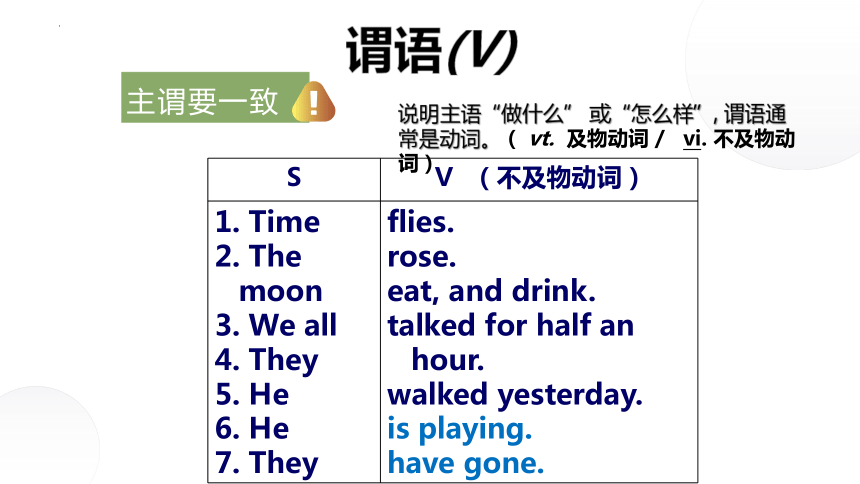
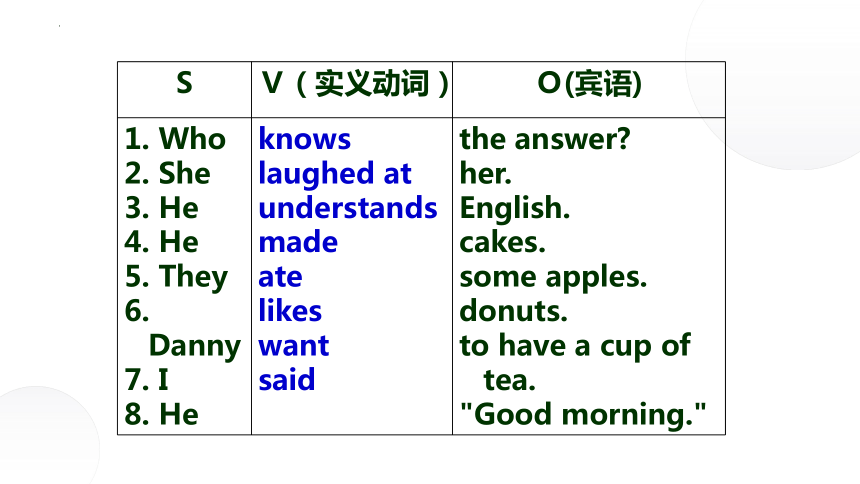
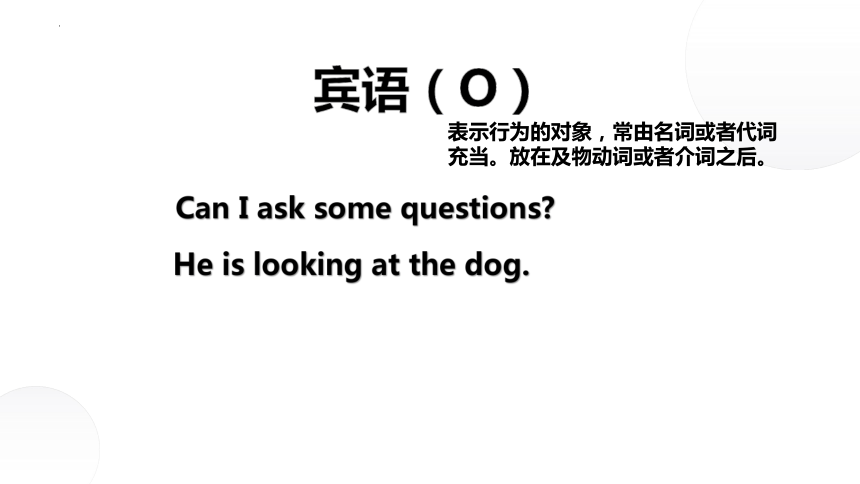
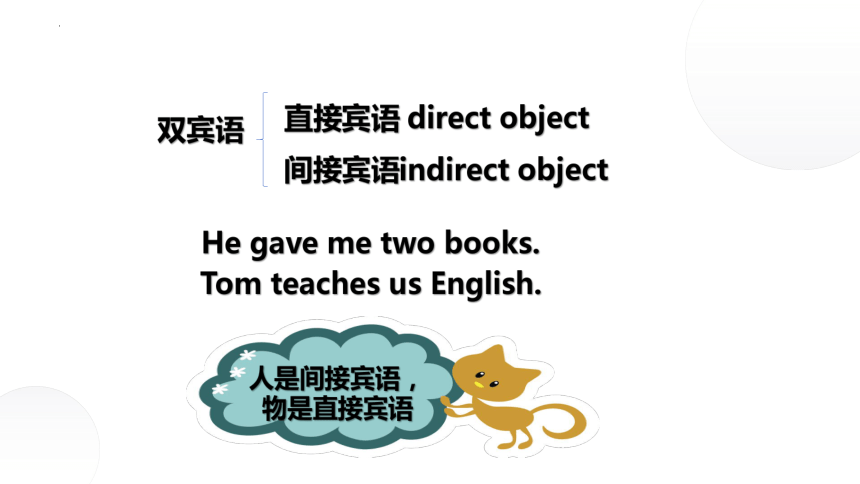
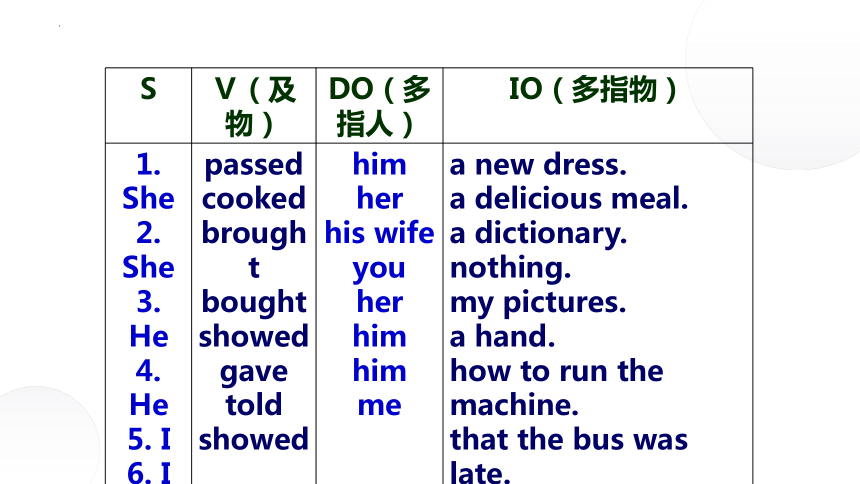
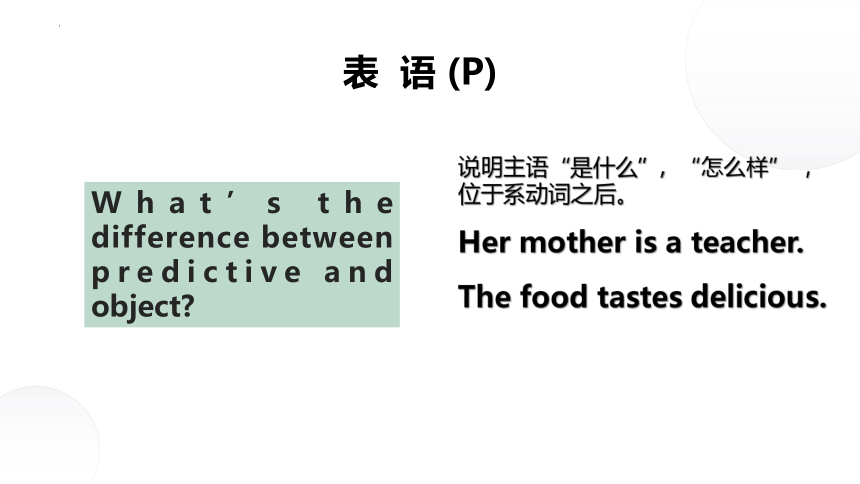
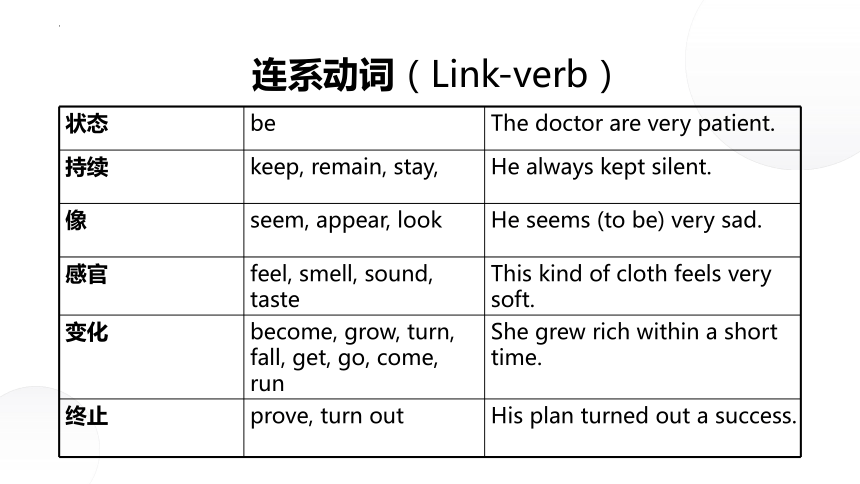
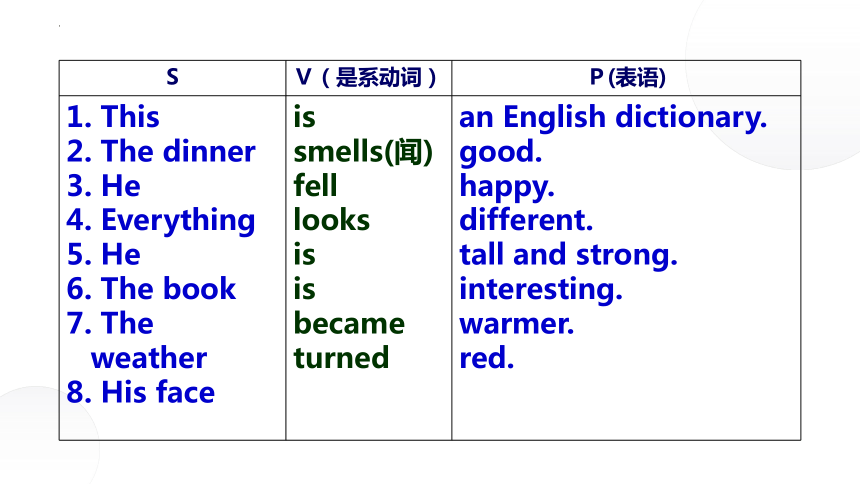
文档简介
(共63张PPT)
WELCOME UNIT
Discovering Useful Structures
01
Grammar
1. 句子的基本成分
S (主语) V(谓语动词) O(宾语)
P(表语) A(状语) DO(直接宾语)
IO(间接宾语) C(宾语补足语)
2. 简单句的基本句型
·SV All of us laughed!
·SVO I miss my grandma.
·SP The teacher was kind and friendly.
·SV IO DO He told us a funny story.
·SVOC I found most of my classmates and teachers friendly and helpful.
·SVA He talked too much.
·SVOA I had my first maths class at senior high school.
·There be… There’s a lot to explore at senior high.
Basic knowledge
主语(Subject)
表示句子所说的是
“什么人”或“什么事物”
Gina is from Australia.
She often goes to the movies.
Three is enough.
Doing the work is hard for him.
To see is to believe.
What he needs is a book.
-名词
-代词
-数词
-动名词
-不定式
-主语从句
谓语(V)
说明主语“做什么” 或“怎么样”, 谓语通常是动词。( vt. 及物动词 / vi. 不及物动词)
主谓要一致
S V (不及物动词)
1. Time 2. The moon 3. We all 4. They 5. He 6. He 7. They flies.
rose.
eat, and drink.
talked for half an hour.
walked yesterday.
is playing.
have gone.
S V(实义动词) O(宾语)
1. Who 2. She 3. He 4. He 5. They 6. Danny 7. I 8. He knows laughed at understands made ate likes want said the answer
her.
English.
cakes.
some apples.
donuts.
to have a cup of tea.
"Good morning."
宾语(O)
表示行为的对象,常由名词或者代词充当。放在及物动词或者介词之后。
Can I ask some questions
He is looking at the dog.
He gave me two books.
Tom teaches us English.
直接宾语 direct object
间接宾语indirect object
人是间接宾语,物是直接宾语
双宾语
S V(及物) DO(多指人) IO(多指物)
1. She 2. She 3. He 4. He 5. I 6. I 7. I 8. He passed cooked brought bought showed gave told showed him her his wife you her him him me a new dress.
a delicious meal.
a dictionary.
nothing.
my pictures.
a hand.
how to run the machine.
that the bus was late.
说明主语“是什么”, “怎么样” ,位于系动词之后。
表 语 (P)
Her mother is a teacher.
The food tastes delicious.
What’s the difference between predictive and object
连系动词(Link-verb)
状态 be The doctor are very patient.
持续 keep, remain, stay, He always kept silent.
像 seem, appear, look He seems (to be) very sad.
感官 feel, smell, sound, taste This kind of cloth feels very soft.
变化 become, grow, turn, fall, get, go, come, run She grew rich within a short time.
终止 prove, turn out His plan turned out a success.
S V(是系动词) P(表语)
1. This 2. The dinner 3. He 4. Everything 5. He 6. The book 7. The weather 8. His face is smells(闻) fell looks is is became turned an English dictionary.
good.
happy.
different.
tall and strong.
interesting.
warmer.
red.
用来补充说明宾语的情况。
“宾语+宾语补足语”称为复合宾语。
宾语补足语(object complement)
We elected him our monitor.
He asked her to take the boy out of school.
What’s the difference between direct and indirect object and object complement
S V(及物) O(宾语) C(宾补)
1. We 2. They 3. They 4. They 5. What 6. We 7. He 8. I keep painted call found makes saw asked saw the table the door supper the house him him me them clean.
green.
dinner.
dirty.
sad
out.
to come back soon.
getting on the bus.
修饰动词、形容词、副词或全句, 说明时间、地点、方式、原因、结果、条件、让步、程度、频率、伴随、目的等。
状 语
Adverbial
The students followed Uncle Wang to see the other machines.
He sat there quietly.
定语(adjective)
用来修饰名词或代词,说明名词或代词的品质与特征。由形容词、代词、数词、名词或名词所有格、介词短语、不定式、动词 -ing 形式、过去分词、从句等或相当于形容词的词或短语充当。
·She is an industrial designer. 她是一名工业设计师。(形容词)
·We went to a lecture on Italian art. 我们去参加了一个关于意大利艺术的讲座。(介词短语)
·The female designer who is from the USA made a deep impression on us. 这位来自美国的女性设计师给我们留下了深刻的印象。(定语从句)
·They are cleaning the fallen leaves in the yard.
他们正在院子里清扫落叶。(过去分词)
Exercise
S
V
1 The 100-year-old school lies in the centre of the city.
2 We must act.
3 The maths homework looks easy.
4 The teacher found the classroom empty.
S
V
A
S
V
S
P
S
V
O
C
Activity 1 Read the sentences and analyse the structures.
EXAMPLE:We laughed.
Exercise
S
V
5 My mum bought me a new dictionary.
6 Tom is looking forward to meeting the new exchange student.
7 There is an English Corner at our school.
8 We had chemistry in the newly built lab.
S
S
V
IO
DO
There be...
V
O
S
V
O
A
Activity 1 Read the sentences and analyse the structures.
EXAMPLE:We laughed.
Exercise
S
V
S
V
A
S
V
IO
DO
V
IO
DO
There be…
S
P
S
V
O
Activity 2 Read the passage and analyse the structures of the underlined sentences.
How would you like to go to school and travel the world at the same time For Tim,that dream has come true! This term,Tim and his classmates are living on a ship! They take the same subjects as you do,like maths and English. They also learn about ships and the sea. Tim writes his parents an email every week and tells them what happened on the ship. Tim loves living on the ship. There’s always something exciting to do. And,after a long day of study,he likes to watch the sun go down and wait for the stars to come out. Studying and doing homework seem much more fun when you are at sea!
附:单元语法精讲精练
单元语法
基本的句子结构
一 句子和句子成分
句子是表达一个完整意义的最小单位,也是构成篇章的重要部分。句子是由词或短语构成的,这些词或短语便是句子成分。句子成分是按照该组成部分在句中所起的作用而划分的。英语中的主要句子成分有主语、谓语、表语、宾语、定语、状语、宾语补足语和同位语。
1. 主语
主语是谓语所表示动作或状态的执行者,是一个句子所叙述的主体,表示句子所说的是“谁”或“什么”。名词(短语)、代词、数词、不定式(短语)、动名词(短语)和从句等都可作主语。主语一般位于句首。
A light wind swept through the trees. 微风从林间掠过。(名词短语作主语)
No one but yourself can help you. 只有你自己才能帮助你。(代词作主语)
Three plus five is eight. 3 加5 得8。(数词作主语)
To drink a cup of cold water in such hot weather is a great pleasure!
这么热的天喝一杯冷水真爽啊 !(不定式短语作主语)
Travelling abroad is popular among young people.
出国旅游受年轻人的欢迎。(动名词短语作主语)
The rich are not always happier than the poor.
有钱人并不总是比穷人快乐。(名词化的形容词作主语)
Generally speaking,what we can’t get seems better than what we have.
一般说来,我们得不到的东西似乎比我们拥有的东西更好。(从句作主语)
It is believed that girls are better at language.
人们认为女孩更擅长语言。(it 是形式主语,真正主语是that 引导的从句)
2. 谓语动词
谓语动词说明主语的行为或具有的特征和状态,由动词充当,一般位于主语的后面,是句子的基本构成成分。谓语动词有人称、数和时态的变化。谓语动词分为简单谓语动词和复合谓语。
(1)简单谓语动词
不论何种时态、语态、语气,凡是由一个动词或动词词组构成的都是简单谓语动词。
The sun rises in the east. 太阳从东方升起。
He looked after two orphans. 他照顾两个孤儿。
I have tried three times in this way. 我已经用这种方法试了三次。
Don’t get off the bus until it comes to a stop. 公共汽车到站后再下车。
Our school was built in 1961. 我们学校建于1961 年。
(2)复合谓语
由“情态动词/ 助动词 + 动词原形”或“连系动词 + 表语” 构成的谓语叫做复合谓语。
He can speak English very well. 他英语说得很好。
The work must be done before three o’clock.
这项工作必须在三点以前做完。
This film is interesting. 这部电影很有意思。
He seems unhappy. 他似乎不高兴。
3. 表语
表语说明主语的性质、特征、身份或状态,与连系动词be,look,seem,appear,feel,taste,smell,sound,become,get, grow,turn,remain,keep,stay 等一起构成复合谓语。表语通常由名词(短语)、代词、形容词、数词、副词、介词短语、不定式(短语)、动名词(短语)、分词(短语)或从句等充当。
They are exchange students. 他们是交换生。(名词短语作表语)
The winner is you. 获胜者是你。(代词作表语)
Julie always looks cheerful. 朱莉看上去总是很高兴。(形容词作表语)
I’ll be eighteen in May,which will be an important time in my life.
到五月份我就18 岁了,那将是我一生中重要的时刻。 ( 数词作表语)
The war was over. 战争结束了。(副词作表语)
He is out of condition. 他身体状况不好。(介词短语作表语)
His dream is to become an engineer.
他的梦想是成为一名工程师。(不定式短语作表语)
My hobby is playing the piano. 我的爱好是弹奏钢琴。(动名词短语作表语)
She is gone. 她走了。(过去分词作表语)
This is what he told me yesterday. 这就是他昨天告诉我的。(从句作表语)
4. 宾语
宾语表示动作的对象或承受者,一般位于及物动词和介词后面。可以用作宾语的有名词(短语)、代词、数词、名词化的形容词、不定式(短语)、动名词(短语)、从句等。宾语又分单宾语、双宾语、复合宾语三种。
(1)单宾语
Richard does not like his job.
理查德不喜欢他的工作。(名词短语作宾语)
I don’t know him. 我不认识他。(代词作宾语)
—How many computers do you need 你们需要几台电脑?
—We need five. 我们需要五台。(数词作宾语)
We donated money and cotton clothes to help the homeless in the flooded area.
我们捐了钱和棉衣帮助那些洪水淹没地区无家可归的人。(名词化的形容词作宾语)
Monica decided to solve the problem on her own.
莫妮卡决定自己解决这个问题。(不定式短语作宾语)
The young man risked losing his life to save the girl.
那个年轻人冒着生命危险去救那个女孩。(动名词短语作宾语)
Miya said that she would return soon.
米娅说她会很快回来的。(从句作宾语)
(2)双宾语
双宾语是指动词后带有两个宾语,一个是间接宾语,一个是直接宾语。直接宾语表示动作的承受者或结果,通常指物; 间接宾语表示动作是对谁做的或为谁做的,通常指人。间接宾语一般位于直接宾语之前,也可位于其后。但位于后面时在间接宾语的前面须加介词to 或for。
They offered me the job. → They offered the job to me.
他们给我提供了那份工作。(me 为间接宾语,the job 为直接宾语)
Please show me your passport. → Please show your passport to me.
请向我出示你的护照。(me 为间接宾语,your pass-port 为直接宾语)
Cora played us some light music. → Cora played some light music for us.
科拉给我们演奏了一些轻音乐。(us 为间接宾语,some light music 为直接宾语)
5. 定语
修饰或限定名词或代词的成分叫做定语。定语是用来描述名词或代词的修饰语,它常和名词构成名词短语。定语分为前置定语和后置定语两种。
(1)前置定语
可以充当前置定语的有形容词、代词、数词、名词或名词所有格、动名词、分词等。一般而言,单个的词语作定语都是前置定语。
This is a difficult problem. 这是一道难题。(形容词作定语)
The doctor told me to open my mouth and put out my tongue.
医生让我张开嘴巴伸出舌头。(代词作定语)
Granny cut the birthday cake into ten pieces.
奶奶把生日蛋糕切成了10 块。(数词作定语)
He works in a trade company. 他在一家贸易公司上班。(名词作定语)
Do you know Vela’s mother
你认识维拉的妈妈吗?(名词所有格作定语)
Books can’t be taken away from the reading room.
书籍不可以从阅览室中带走。(动名词作定语)
We should adapt to the changing situation quickly.
我们应该迅速地适应变化的形势。(现在分词作定语)
Is there any difference between spoken English and written English
英语口语和书面语之间存在什么不同吗?(过去分词作定语)
(2)后置定语
可以充当后置定语的有形容词短语、介词短语、地点方位副词、不定式短语、分词短语、从句等。词组或从句作定语都是后置定语。
The lady was carrying a basket full of vegetables.
那位女士提着一只盛满蔬菜的篮子。(形容词短语作定语)
The girl in white is his sister. 穿白衣服的女孩是他妹妹。(介词短语作定语)
Fill in the blanks in the sentences below. 在下面的句子中填空。(地点方位副词作定语)
You should grasp this chance to go abroad. 你应该抓住这次出国的机会。(不定式短语作定语)
Do you know the man speaking to our headmaster
你认识正在跟我们的校长说话的那个人吗?(现在分词短语作定语)
Most of the people invited to the conference are from Europe.
应邀出席会议的人大多数来自欧洲。(过去分词短语作定语)
Do you know the man who spoke just now
你认识刚才发言的那个人吗?(从句作定语)
特别提示
如果被修饰词为some,any,every,no 和thing/body/one 等构成的复合不定代词,定语要放在这些词的后面。
There is nothing interesting in the book. 这本书没有什么有趣的内容。
I have something important to tell you. 我有重要的事情要告诉你。
We were afraid it was somebody important. 我们还担心是某位要人呢。
6. 状语
状语是用来修饰动词、形容词、副词或句子的一种成分。它可以表示时间、地点、方式、程度、原因、目的、结果、条件、让步或比较等,通常由副词、介词短语、不定式(短语)、分词(短语)、形容词、名词(短语)、从句等充当。
Jennifer runs very fast. 珍妮弗跑得很快。(副词作状语)
I’ll be back in a while. 我一会儿就回来。(介词短语作状语)
He waited to see the result of the game.
他等着看比赛结果。(不定式短语作状语)
Living far from the company,I have to get up early every morning.
由于住得离公司很远,我每天早上都得早起。(现在分词短语作状语)
Given more time,we would have done the work better.
如果给我们更多时间的话,我们本会把工作做得更好。(过去分词短语作状语)
She sat there,silent. 她坐在那儿,一声不吭。(形容词作状语)
Wait a moment. I’ll come. 等一会儿,我就来。(名词短语作状语)
He was absent from the lecture yesterday because he was ill.
昨天他没参加讲座,是因为病了。(从句作状语)
7. 宾语补足语
宾语补足语是用来说明宾语的性质、状态等的一种句子成分。宾语和宾语补足语构成了复合宾语,它们在逻辑上有主谓关系。名词(短语)、形容词(短语)、副词、介词短语、不定式(短语)、分词(短语)等皆可作宾补。
She was appointed manager of the company.
她被任命为公司经理。(名词短语作宾补)
Tibet always keeps him spellbound.
西藏总是令他入迷。(形容词作宾补)
We should keep our classroom clean and tidy.
我们应该保持教室干净整洁。(形容词短语作宾补)
Miranda likes sleeping with the light on.
米兰达喜欢开着灯睡觉。(副词作宾补)
When she woke up,she found herself in a hospital.
当她醒来时,她发现自己在一家医院里。(介词短语作宾补)
Her mother doesn’t allow her to go out alone at night.
她妈妈不允许她晚上一个人出去。(不定式短语作宾补)
Our English teacher always has us reading and reciting.
我们的英语老师总是让我们读和背。(现在分词短语作宾补)
8. 同位语
对句子中某一成分作进一步解释说明,与该成分在语法上处于同等地位的句子成分叫做同位语。可以用作同位语的有名词(短语)、代词、数词或从句等。
This is Mr Li,our headmaster.
这是我们的校长李老师。(名词短语作同位语)
We each have a cellphone now.
现在我们每个人都有手机了。(代词作同位语)
Are you two ready to start out now
你们两个人都准备好现在出发了吗?(数词作同位语)
The news that our team has won again is true.
我们队又赢了的消息是真的。(从句作同位语)
二 八种基本句型
不同的句子成分构成了英语中各式各样的句子。所有句子中,归纳起来共有八种最基本的句型。其他的各种句型都是由这八种基本句型扩展而来的。
1. S + V 句式
这种句式中的V 是指不及物动词。
在英语中大多数动词既可作及物动词又可作不及物动词,纯粹的不及物动词数量较少。常见的有apologize, appear,arrive,come,die,disappear,dive,exist,fall,flow, happen,rise 等。
What happened over there 那儿发生了什么事?
Kevin apologized to his mother for his rudeness.
凯文为他的粗鲁向他母亲道了歉。
2. S + V + O 句式
英语中绝大多数及物动词都是只带一个宾语的动词。
Farmers in our county grow all kinds of vegetables.
我们县的农民种植各种各样的蔬菜。
Danny runs a big clothes factory.
丹尼经营一家大型服装厂。
3. S + V + P 句式
这种句型结构主要指谓语动词为连系动词的情况。连系动词除be 外,还有look,seem,appear,feel,taste,smell, sound,become,get,grow,turn,remain,keep,stay 等。作表语的可以是名词、形容词、代词、副词、介词短语、不定式(短语)、动名词(短语)、从句等。
Jackson is a common English name. 杰克逊是常见的英语人名。
The weather is becoming colder and colder. 天气变得越来越冷。
It looks like a made-up word. 这看起来像是一个杜撰的词。
Her job is looking after children. 她的工作是照顾小孩。
4. S + V + IO + DO 句式
这是带双宾语的句式结构,IO 为间接宾语,DO 为直接宾语。直接宾语一般是指物的名词或代词,间接宾语一般是指人的名词或代词。
Her boyfriend promised her a birthday gift.
她男朋友答应给她一份生日礼物。
Father made me a wooden gun. 爸爸给我做了一把木头枪。
The rescued miners told us a lot about their adventures.
被营救的矿工告诉了我们很多关于他们的冒险经历。
5. S + V + O + C 句式
“主语 + 谓语动词 + 宾语 + 宾语补足语”是英语句子中较为常见的句式。可作宾语补足语的有名词(短语)、形容词(短语)、副词、介词短语、不定式(短语)、分词(短语)等。
We have made our city a beautiful garden. 我们已把我们的城市变成了一座美丽的花园。
I painted the fence dark green. 我把栅栏漆成了深绿色。
Sara would like me to accompany her. 萨拉想让我陪伴着她。
I suppose him (to be) a reliable man. 我认为他是个可靠的男人。
We noticed a car crash into a building. 我们看到一辆汽车冲进了一栋楼里。
Teachers should not have students doing their homework all day.
老师不该让学生整天做作业。
She has had all photos developed. 她已经把所有的照片冲洗出来了
6. S + V + A 句式
有时候在谓语动词之后,必须加上一个状语,否则句子就没有意义或意思不完整。这种状语叫做“必具性状语”。
He lives in the countryside. 他住在乡下。
She walks fast. 她走路很快。
7. S + V + O + A 句式
有时候在宾语之后,也要加上一个“必具性状语”,否则句子就没有意义或意思不完整。
Mary put her book on the desk. 玛丽把书放在课桌上。
They treat me very well. 他们待我很好。
8. There be... 存在句
There be... 句型是英语中最常用的句型之一,此句型由“there + be + 主语 + 状语”构成,表示存在关系,意为“(在……)有……”。它其实是倒装句的一种,主语位于谓语动词 be 之后,there 仅为引导词,并无实际意义。
There’s a restaurant around the corner. 拐角处有一家餐馆。
There are two people waiting outside. 有两个人正在外面等候。
此句型有时不用 be 动词,而用不及物动词 live, stand,come,go,lie,remain,exist 等。
There stands a hill in the middle of the park. 在公园中央有一座小山。
Once upon a time there lived an old king in the town. 从前,镇上住着一位老国王。
特别提示
在 there be 句型中,be 动词在人称和数上要和紧靠它的主语保持一致。
There is a ruler,two pens and five books in the schoolbag.
书包里有一把尺子、两支钢笔和五本书。
There are two pens,a ruler and five books in the schoolbag.
书包里有两支钢笔、一把尺子和五本书。
状语
谓语
定语
表语
宾语
语法专项训练
Ⅰ 写出画线部分在句中所作的成分(黑体部分为本单元词汇)
A(基础练——知识巩固)
1. After the lecture,please exchange views with your partner.
2. When you register your information,don’t forget to fill in your name,sex(male or female),age,and nationality.
3. We look forward to visiting the Eiffel Tower designed by a famous designer.
4. After registration,the freshmen were anxious to visit the campus.
5. John doesn’t plan to go to senior high school after graduating from junior high school.
宾语补足语
主语
宾语
宾语
状语
6. I found my partner confident and outgoing.
7. The company organised a research team to explore new technologies by doing experiments.
8. Jack couldn’t concentrate on the lecture when he took notes on his flash cards.
9. To achieve your learning goal,you must revise your learning strategy.
10. John was so curious about everything on campus that he was deeply impressed.
定语
宾补
谓语
表语
宾语
11. People with an outgoing personality are often confident (full of confidence).
12. I found my partner very annoyed. I couldn’t leave him alone,and I tried to calm him down.
13. I can’t persuade him. What if he gets annoyed
14. At first the tiger was frightened of the donkey,but at last it frightened the donkey away.
15. The organisation held a formal meeting to discuss the style of that nation.
主语
表语
状语
B(提高练——对接高考)
1.[2022·新高考全国Ⅰ卷]The Chinese government recently finalized a plan to set up a Giant Panda National Park(GPNP).
中国政府最近敲定了建立大熊猫国家公园的计划。
2.[2022·新高考全国Ⅰ卷]Covering an area about three times the size of Yellowstone National Park,the GPNP will be one of the first national parks in the country.
GPNP 占地面积约为黄石国家公园的三倍,将成为中国首批国家公园之一。
3.[2022·新高考全国Ⅰ卷]After a three-year pilot period, the GPNP will be officially set up next year.
经过三年的试点期,GPNP 将于明年正式建立。
定语
表语
宾语
4.[2022·新高考全国Ⅱ卷]When he saw a young child hanging from a sixth-floor apartment balcony,Henry ran one hundred metres,jumped over a 1. 2-metre fence, and held out his arms to catch the falling child.
当他看到一个小孩挂在六楼公寓的阳台上时,亨利跑了一百米,跳过1. 2 米高的篱笆,伸出双臂接住掉下来的小孩。
5.[2022·新高考全国Ⅱ卷]The boy is in the hospital and doctors say he’ll be OK. 男孩在医院,医生说他不会有事的。
6.[2022·新高考全国Ⅱ卷]The Brown family live in an apartment building outside Toronto.
布朗一家住在多伦多郊外的一栋公寓楼里。
宾语补足语
谓语
宾语补足语
7.[2022·新高考全国Ⅱ卷]Eric woke up a little later when he heard children playing outside.
过了一会儿埃里克醒了,他听到孩子们在外面玩。
8.[2022·新高考全国Ⅱ卷]“He saved my son’s life,” said Mrs. Brown.“I don’t know how to thank him.”
“他救了我儿子的命,”布朗太太说。“我不知道该怎么感谢他。”
9.[2022·全国甲卷]Cao believes this will make the hiking trip even more meaningful.
曹(先生)认为,这会让这次徒步旅行更有意义。
S
V
O
S
A
V
O
A
S
V
O
C
A
S
V
O
A
S
V
P
A
Ⅱ 分析下列各句的句子成分(S 主语;V 谓语动词;O 宾语;A 状语;C 宾补;P 表语)
My partner wants to make a good impression.
2. That guy just had his first maths class in senior high school!
3. I found most of my classmates and teachers friendly and helpful.
4. This afternoon,we had our chemistry class in the science lab.
5. I didn’t feel awkward or frightened at all.
S
V
P
S
V
O
A
S
V
O
S
V
O
A
S
V
P
A
6. My favourite subject is physics.
7. Jack plans to become a designer in the future.
8. The organisation held a formal meeting.
9. Our school organised a speech competition to improve our English.
10. I am a Grade 10 student at South Hill High School.
Language points
核心词汇
1 Tom is looking forward to meeting the new exchange student.
汤姆期待着与新来的交换生见面。
look forward to 盼望;期待
Everyone looks forward to progress,whether in one’s personal life or in the general society. 无论是在个人生活中还是在全体社会中, 每个人都期待着进步。
I hope you can accept our invitation. Looking forward to your early reply.
我希望您能接受我们的邀请。期待您的早日回复。常用于邮件以及书信的结尾,表达某种期待
With the Spring Festival drawing near,the children look forward to meeting their grandparents in the countryside. with复合结构
随着春节的临近,孩子们盼望着去乡下看望他们的祖父母。
题组练·领悟方法
词块背诵
(1)“look forward to + n. /pron. /v. -ing”,to 是介词。类似的短语还有:
be/get used to 习惯于 stick to 坚持
pay attention to 注意 get down to 开始做
lead to 导致 contribute to 有助于;导致
(2)look forward to 是“动词 + 副词 + 介词”型短语。再如:
look back on 回顾,回忆起 look down on/upon 轻视,瞧不起
look up to 仰慕,尊敬 look out for 注意,当心,留意
run out of 用完,用尽 think highly of 对……评价高
break away from 脱离;逃离 keep away from 远离
do away with 摆脱,废除 add up to 总数为
live up to 不辜负 catch up with 赶上
make up for 弥补,补偿 come up with 提出,想出(答案等)
put up with 容忍 get on/along with 与……相处
Nothing can make up for what they have suffered.
什么也弥补不了他们所承受的痛苦。
No one has come up with a convincing explanation of why dinosaurs died out.
没有人对恐龙灭绝的原因提出过令人信服的解释。
to
seeing
came
she was looking forward to 是定语从句,修饰the summer holiday。空格处作谓语,根据定语从句的时态可知,主句应用一般过去时。
being invited
cleaning
I’m looking forward to hearing from you as soon as possible.
单句语法填空
(1) We all miss you and are looking forward your early recovery.
(2) We are looking forward to (see)the film at the cinema.
(3) The summer holiday she was looking forward to (come)at last.
(4) We’re looking forward to (invite)to a formal dinner.
(5) The lady got down to (clean)the room as soon as she got home.
翻译句子
(6) 我期盼着尽快收到你的来信。(hear from,as soon as possible)
______________________________________________________________________
2 ...he likes to watch the sun go down... ……他喜欢看日落……
go down
(1)(日、月)落到地平线下,落下;(船等)下沉,沉没
It is a great pleasure to watch the sun go down on Mount Huang.
在黄山上看日落真是一件十分快乐的事情。
The ship went down to the bottom of the sea. 船沉入了海底。
(2)(物价等)下跌;(温度等)下降
Thanks to the measures,the prices have gone down.
多亏了这些措施,价格已经下降了。
(3)被记下,被写下,载入(不用于被动语态)
He will go down in history as a great scientist. 他将作为一位伟大的科学家名垂青史。
went down
go down in history
完成句子
(1)他们的船因暴风雨而沉没了。幸运的是,他们被一艘中国船救起。
Their boat because of the storm. Luckily,they were picked up by a Chinese ship.
(2)那些在救火中牺牲的消防队员将因他们的英勇事迹而载入史册。
The firemen who died when they were fighting the fire will for their brave deeds.
THE END
WELCOME UNIT
Discovering Useful Structures
01
Grammar
1. 句子的基本成分
S (主语) V(谓语动词) O(宾语)
P(表语) A(状语) DO(直接宾语)
IO(间接宾语) C(宾语补足语)
2. 简单句的基本句型
·SV All of us laughed!
·SVO I miss my grandma.
·SP The teacher was kind and friendly.
·SV IO DO He told us a funny story.
·SVOC I found most of my classmates and teachers friendly and helpful.
·SVA He talked too much.
·SVOA I had my first maths class at senior high school.
·There be… There’s a lot to explore at senior high.
Basic knowledge
主语(Subject)
表示句子所说的是
“什么人”或“什么事物”
Gina is from Australia.
She often goes to the movies.
Three is enough.
Doing the work is hard for him.
To see is to believe.
What he needs is a book.
-名词
-代词
-数词
-动名词
-不定式
-主语从句
谓语(V)
说明主语“做什么” 或“怎么样”, 谓语通常是动词。( vt. 及物动词 / vi. 不及物动词)
主谓要一致
S V (不及物动词)
1. Time 2. The moon 3. We all 4. They 5. He 6. He 7. They flies.
rose.
eat, and drink.
talked for half an hour.
walked yesterday.
is playing.
have gone.
S V(实义动词) O(宾语)
1. Who 2. She 3. He 4. He 5. They 6. Danny 7. I 8. He knows laughed at understands made ate likes want said the answer
her.
English.
cakes.
some apples.
donuts.
to have a cup of tea.
"Good morning."
宾语(O)
表示行为的对象,常由名词或者代词充当。放在及物动词或者介词之后。
Can I ask some questions
He is looking at the dog.
He gave me two books.
Tom teaches us English.
直接宾语 direct object
间接宾语indirect object
人是间接宾语,物是直接宾语
双宾语
S V(及物) DO(多指人) IO(多指物)
1. She 2. She 3. He 4. He 5. I 6. I 7. I 8. He passed cooked brought bought showed gave told showed him her his wife you her him him me a new dress.
a delicious meal.
a dictionary.
nothing.
my pictures.
a hand.
how to run the machine.
that the bus was late.
说明主语“是什么”, “怎么样” ,位于系动词之后。
表 语 (P)
Her mother is a teacher.
The food tastes delicious.
What’s the difference between predictive and object
连系动词(Link-verb)
状态 be The doctor are very patient.
持续 keep, remain, stay, He always kept silent.
像 seem, appear, look He seems (to be) very sad.
感官 feel, smell, sound, taste This kind of cloth feels very soft.
变化 become, grow, turn, fall, get, go, come, run She grew rich within a short time.
终止 prove, turn out His plan turned out a success.
S V(是系动词) P(表语)
1. This 2. The dinner 3. He 4. Everything 5. He 6. The book 7. The weather 8. His face is smells(闻) fell looks is is became turned an English dictionary.
good.
happy.
different.
tall and strong.
interesting.
warmer.
red.
用来补充说明宾语的情况。
“宾语+宾语补足语”称为复合宾语。
宾语补足语(object complement)
We elected him our monitor.
He asked her to take the boy out of school.
What’s the difference between direct and indirect object and object complement
S V(及物) O(宾语) C(宾补)
1. We 2. They 3. They 4. They 5. What 6. We 7. He 8. I keep painted call found makes saw asked saw the table the door supper the house him him me them clean.
green.
dinner.
dirty.
sad
out.
to come back soon.
getting on the bus.
修饰动词、形容词、副词或全句, 说明时间、地点、方式、原因、结果、条件、让步、程度、频率、伴随、目的等。
状 语
Adverbial
The students followed Uncle Wang to see the other machines.
He sat there quietly.
定语(adjective)
用来修饰名词或代词,说明名词或代词的品质与特征。由形容词、代词、数词、名词或名词所有格、介词短语、不定式、动词 -ing 形式、过去分词、从句等或相当于形容词的词或短语充当。
·She is an industrial designer. 她是一名工业设计师。(形容词)
·We went to a lecture on Italian art. 我们去参加了一个关于意大利艺术的讲座。(介词短语)
·The female designer who is from the USA made a deep impression on us. 这位来自美国的女性设计师给我们留下了深刻的印象。(定语从句)
·They are cleaning the fallen leaves in the yard.
他们正在院子里清扫落叶。(过去分词)
Exercise
S
V
1 The 100-year-old school lies in the centre of the city.
2 We must act.
3 The maths homework looks easy.
4 The teacher found the classroom empty.
S
V
A
S
V
S
P
S
V
O
C
Activity 1 Read the sentences and analyse the structures.
EXAMPLE:We laughed.
Exercise
S
V
5 My mum bought me a new dictionary.
6 Tom is looking forward to meeting the new exchange student.
7 There is an English Corner at our school.
8 We had chemistry in the newly built lab.
S
S
V
IO
DO
There be...
V
O
S
V
O
A
Activity 1 Read the sentences and analyse the structures.
EXAMPLE:We laughed.
Exercise
S
V
S
V
A
S
V
IO
DO
V
IO
DO
There be…
S
P
S
V
O
Activity 2 Read the passage and analyse the structures of the underlined sentences.
How would you like to go to school and travel the world at the same time For Tim,that dream has come true! This term,Tim and his classmates are living on a ship! They take the same subjects as you do,like maths and English. They also learn about ships and the sea. Tim writes his parents an email every week and tells them what happened on the ship. Tim loves living on the ship. There’s always something exciting to do. And,after a long day of study,he likes to watch the sun go down and wait for the stars to come out. Studying and doing homework seem much more fun when you are at sea!
附:单元语法精讲精练
单元语法
基本的句子结构
一 句子和句子成分
句子是表达一个完整意义的最小单位,也是构成篇章的重要部分。句子是由词或短语构成的,这些词或短语便是句子成分。句子成分是按照该组成部分在句中所起的作用而划分的。英语中的主要句子成分有主语、谓语、表语、宾语、定语、状语、宾语补足语和同位语。
1. 主语
主语是谓语所表示动作或状态的执行者,是一个句子所叙述的主体,表示句子所说的是“谁”或“什么”。名词(短语)、代词、数词、不定式(短语)、动名词(短语)和从句等都可作主语。主语一般位于句首。
A light wind swept through the trees. 微风从林间掠过。(名词短语作主语)
No one but yourself can help you. 只有你自己才能帮助你。(代词作主语)
Three plus five is eight. 3 加5 得8。(数词作主语)
To drink a cup of cold water in such hot weather is a great pleasure!
这么热的天喝一杯冷水真爽啊 !(不定式短语作主语)
Travelling abroad is popular among young people.
出国旅游受年轻人的欢迎。(动名词短语作主语)
The rich are not always happier than the poor.
有钱人并不总是比穷人快乐。(名词化的形容词作主语)
Generally speaking,what we can’t get seems better than what we have.
一般说来,我们得不到的东西似乎比我们拥有的东西更好。(从句作主语)
It is believed that girls are better at language.
人们认为女孩更擅长语言。(it 是形式主语,真正主语是that 引导的从句)
2. 谓语动词
谓语动词说明主语的行为或具有的特征和状态,由动词充当,一般位于主语的后面,是句子的基本构成成分。谓语动词有人称、数和时态的变化。谓语动词分为简单谓语动词和复合谓语。
(1)简单谓语动词
不论何种时态、语态、语气,凡是由一个动词或动词词组构成的都是简单谓语动词。
The sun rises in the east. 太阳从东方升起。
He looked after two orphans. 他照顾两个孤儿。
I have tried three times in this way. 我已经用这种方法试了三次。
Don’t get off the bus until it comes to a stop. 公共汽车到站后再下车。
Our school was built in 1961. 我们学校建于1961 年。
(2)复合谓语
由“情态动词/ 助动词 + 动词原形”或“连系动词 + 表语” 构成的谓语叫做复合谓语。
He can speak English very well. 他英语说得很好。
The work must be done before three o’clock.
这项工作必须在三点以前做完。
This film is interesting. 这部电影很有意思。
He seems unhappy. 他似乎不高兴。
3. 表语
表语说明主语的性质、特征、身份或状态,与连系动词be,look,seem,appear,feel,taste,smell,sound,become,get, grow,turn,remain,keep,stay 等一起构成复合谓语。表语通常由名词(短语)、代词、形容词、数词、副词、介词短语、不定式(短语)、动名词(短语)、分词(短语)或从句等充当。
They are exchange students. 他们是交换生。(名词短语作表语)
The winner is you. 获胜者是你。(代词作表语)
Julie always looks cheerful. 朱莉看上去总是很高兴。(形容词作表语)
I’ll be eighteen in May,which will be an important time in my life.
到五月份我就18 岁了,那将是我一生中重要的时刻。 ( 数词作表语)
The war was over. 战争结束了。(副词作表语)
He is out of condition. 他身体状况不好。(介词短语作表语)
His dream is to become an engineer.
他的梦想是成为一名工程师。(不定式短语作表语)
My hobby is playing the piano. 我的爱好是弹奏钢琴。(动名词短语作表语)
She is gone. 她走了。(过去分词作表语)
This is what he told me yesterday. 这就是他昨天告诉我的。(从句作表语)
4. 宾语
宾语表示动作的对象或承受者,一般位于及物动词和介词后面。可以用作宾语的有名词(短语)、代词、数词、名词化的形容词、不定式(短语)、动名词(短语)、从句等。宾语又分单宾语、双宾语、复合宾语三种。
(1)单宾语
Richard does not like his job.
理查德不喜欢他的工作。(名词短语作宾语)
I don’t know him. 我不认识他。(代词作宾语)
—How many computers do you need 你们需要几台电脑?
—We need five. 我们需要五台。(数词作宾语)
We donated money and cotton clothes to help the homeless in the flooded area.
我们捐了钱和棉衣帮助那些洪水淹没地区无家可归的人。(名词化的形容词作宾语)
Monica decided to solve the problem on her own.
莫妮卡决定自己解决这个问题。(不定式短语作宾语)
The young man risked losing his life to save the girl.
那个年轻人冒着生命危险去救那个女孩。(动名词短语作宾语)
Miya said that she would return soon.
米娅说她会很快回来的。(从句作宾语)
(2)双宾语
双宾语是指动词后带有两个宾语,一个是间接宾语,一个是直接宾语。直接宾语表示动作的承受者或结果,通常指物; 间接宾语表示动作是对谁做的或为谁做的,通常指人。间接宾语一般位于直接宾语之前,也可位于其后。但位于后面时在间接宾语的前面须加介词to 或for。
They offered me the job. → They offered the job to me.
他们给我提供了那份工作。(me 为间接宾语,the job 为直接宾语)
Please show me your passport. → Please show your passport to me.
请向我出示你的护照。(me 为间接宾语,your pass-port 为直接宾语)
Cora played us some light music. → Cora played some light music for us.
科拉给我们演奏了一些轻音乐。(us 为间接宾语,some light music 为直接宾语)
5. 定语
修饰或限定名词或代词的成分叫做定语。定语是用来描述名词或代词的修饰语,它常和名词构成名词短语。定语分为前置定语和后置定语两种。
(1)前置定语
可以充当前置定语的有形容词、代词、数词、名词或名词所有格、动名词、分词等。一般而言,单个的词语作定语都是前置定语。
This is a difficult problem. 这是一道难题。(形容词作定语)
The doctor told me to open my mouth and put out my tongue.
医生让我张开嘴巴伸出舌头。(代词作定语)
Granny cut the birthday cake into ten pieces.
奶奶把生日蛋糕切成了10 块。(数词作定语)
He works in a trade company. 他在一家贸易公司上班。(名词作定语)
Do you know Vela’s mother
你认识维拉的妈妈吗?(名词所有格作定语)
Books can’t be taken away from the reading room.
书籍不可以从阅览室中带走。(动名词作定语)
We should adapt to the changing situation quickly.
我们应该迅速地适应变化的形势。(现在分词作定语)
Is there any difference between spoken English and written English
英语口语和书面语之间存在什么不同吗?(过去分词作定语)
(2)后置定语
可以充当后置定语的有形容词短语、介词短语、地点方位副词、不定式短语、分词短语、从句等。词组或从句作定语都是后置定语。
The lady was carrying a basket full of vegetables.
那位女士提着一只盛满蔬菜的篮子。(形容词短语作定语)
The girl in white is his sister. 穿白衣服的女孩是他妹妹。(介词短语作定语)
Fill in the blanks in the sentences below. 在下面的句子中填空。(地点方位副词作定语)
You should grasp this chance to go abroad. 你应该抓住这次出国的机会。(不定式短语作定语)
Do you know the man speaking to our headmaster
你认识正在跟我们的校长说话的那个人吗?(现在分词短语作定语)
Most of the people invited to the conference are from Europe.
应邀出席会议的人大多数来自欧洲。(过去分词短语作定语)
Do you know the man who spoke just now
你认识刚才发言的那个人吗?(从句作定语)
特别提示
如果被修饰词为some,any,every,no 和thing/body/one 等构成的复合不定代词,定语要放在这些词的后面。
There is nothing interesting in the book. 这本书没有什么有趣的内容。
I have something important to tell you. 我有重要的事情要告诉你。
We were afraid it was somebody important. 我们还担心是某位要人呢。
6. 状语
状语是用来修饰动词、形容词、副词或句子的一种成分。它可以表示时间、地点、方式、程度、原因、目的、结果、条件、让步或比较等,通常由副词、介词短语、不定式(短语)、分词(短语)、形容词、名词(短语)、从句等充当。
Jennifer runs very fast. 珍妮弗跑得很快。(副词作状语)
I’ll be back in a while. 我一会儿就回来。(介词短语作状语)
He waited to see the result of the game.
他等着看比赛结果。(不定式短语作状语)
Living far from the company,I have to get up early every morning.
由于住得离公司很远,我每天早上都得早起。(现在分词短语作状语)
Given more time,we would have done the work better.
如果给我们更多时间的话,我们本会把工作做得更好。(过去分词短语作状语)
She sat there,silent. 她坐在那儿,一声不吭。(形容词作状语)
Wait a moment. I’ll come. 等一会儿,我就来。(名词短语作状语)
He was absent from the lecture yesterday because he was ill.
昨天他没参加讲座,是因为病了。(从句作状语)
7. 宾语补足语
宾语补足语是用来说明宾语的性质、状态等的一种句子成分。宾语和宾语补足语构成了复合宾语,它们在逻辑上有主谓关系。名词(短语)、形容词(短语)、副词、介词短语、不定式(短语)、分词(短语)等皆可作宾补。
She was appointed manager of the company.
她被任命为公司经理。(名词短语作宾补)
Tibet always keeps him spellbound.
西藏总是令他入迷。(形容词作宾补)
We should keep our classroom clean and tidy.
我们应该保持教室干净整洁。(形容词短语作宾补)
Miranda likes sleeping with the light on.
米兰达喜欢开着灯睡觉。(副词作宾补)
When she woke up,she found herself in a hospital.
当她醒来时,她发现自己在一家医院里。(介词短语作宾补)
Her mother doesn’t allow her to go out alone at night.
她妈妈不允许她晚上一个人出去。(不定式短语作宾补)
Our English teacher always has us reading and reciting.
我们的英语老师总是让我们读和背。(现在分词短语作宾补)
8. 同位语
对句子中某一成分作进一步解释说明,与该成分在语法上处于同等地位的句子成分叫做同位语。可以用作同位语的有名词(短语)、代词、数词或从句等。
This is Mr Li,our headmaster.
这是我们的校长李老师。(名词短语作同位语)
We each have a cellphone now.
现在我们每个人都有手机了。(代词作同位语)
Are you two ready to start out now
你们两个人都准备好现在出发了吗?(数词作同位语)
The news that our team has won again is true.
我们队又赢了的消息是真的。(从句作同位语)
二 八种基本句型
不同的句子成分构成了英语中各式各样的句子。所有句子中,归纳起来共有八种最基本的句型。其他的各种句型都是由这八种基本句型扩展而来的。
1. S + V 句式
这种句式中的V 是指不及物动词。
在英语中大多数动词既可作及物动词又可作不及物动词,纯粹的不及物动词数量较少。常见的有apologize, appear,arrive,come,die,disappear,dive,exist,fall,flow, happen,rise 等。
What happened over there 那儿发生了什么事?
Kevin apologized to his mother for his rudeness.
凯文为他的粗鲁向他母亲道了歉。
2. S + V + O 句式
英语中绝大多数及物动词都是只带一个宾语的动词。
Farmers in our county grow all kinds of vegetables.
我们县的农民种植各种各样的蔬菜。
Danny runs a big clothes factory.
丹尼经营一家大型服装厂。
3. S + V + P 句式
这种句型结构主要指谓语动词为连系动词的情况。连系动词除be 外,还有look,seem,appear,feel,taste,smell, sound,become,get,grow,turn,remain,keep,stay 等。作表语的可以是名词、形容词、代词、副词、介词短语、不定式(短语)、动名词(短语)、从句等。
Jackson is a common English name. 杰克逊是常见的英语人名。
The weather is becoming colder and colder. 天气变得越来越冷。
It looks like a made-up word. 这看起来像是一个杜撰的词。
Her job is looking after children. 她的工作是照顾小孩。
4. S + V + IO + DO 句式
这是带双宾语的句式结构,IO 为间接宾语,DO 为直接宾语。直接宾语一般是指物的名词或代词,间接宾语一般是指人的名词或代词。
Her boyfriend promised her a birthday gift.
她男朋友答应给她一份生日礼物。
Father made me a wooden gun. 爸爸给我做了一把木头枪。
The rescued miners told us a lot about their adventures.
被营救的矿工告诉了我们很多关于他们的冒险经历。
5. S + V + O + C 句式
“主语 + 谓语动词 + 宾语 + 宾语补足语”是英语句子中较为常见的句式。可作宾语补足语的有名词(短语)、形容词(短语)、副词、介词短语、不定式(短语)、分词(短语)等。
We have made our city a beautiful garden. 我们已把我们的城市变成了一座美丽的花园。
I painted the fence dark green. 我把栅栏漆成了深绿色。
Sara would like me to accompany her. 萨拉想让我陪伴着她。
I suppose him (to be) a reliable man. 我认为他是个可靠的男人。
We noticed a car crash into a building. 我们看到一辆汽车冲进了一栋楼里。
Teachers should not have students doing their homework all day.
老师不该让学生整天做作业。
She has had all photos developed. 她已经把所有的照片冲洗出来了
6. S + V + A 句式
有时候在谓语动词之后,必须加上一个状语,否则句子就没有意义或意思不完整。这种状语叫做“必具性状语”。
He lives in the countryside. 他住在乡下。
She walks fast. 她走路很快。
7. S + V + O + A 句式
有时候在宾语之后,也要加上一个“必具性状语”,否则句子就没有意义或意思不完整。
Mary put her book on the desk. 玛丽把书放在课桌上。
They treat me very well. 他们待我很好。
8. There be... 存在句
There be... 句型是英语中最常用的句型之一,此句型由“there + be + 主语 + 状语”构成,表示存在关系,意为“(在……)有……”。它其实是倒装句的一种,主语位于谓语动词 be 之后,there 仅为引导词,并无实际意义。
There’s a restaurant around the corner. 拐角处有一家餐馆。
There are two people waiting outside. 有两个人正在外面等候。
此句型有时不用 be 动词,而用不及物动词 live, stand,come,go,lie,remain,exist 等。
There stands a hill in the middle of the park. 在公园中央有一座小山。
Once upon a time there lived an old king in the town. 从前,镇上住着一位老国王。
特别提示
在 there be 句型中,be 动词在人称和数上要和紧靠它的主语保持一致。
There is a ruler,two pens and five books in the schoolbag.
书包里有一把尺子、两支钢笔和五本书。
There are two pens,a ruler and five books in the schoolbag.
书包里有两支钢笔、一把尺子和五本书。
状语
谓语
定语
表语
宾语
语法专项训练
Ⅰ 写出画线部分在句中所作的成分(黑体部分为本单元词汇)
A(基础练——知识巩固)
1. After the lecture,please exchange views with your partner.
2. When you register your information,don’t forget to fill in your name,sex(male or female),age,and nationality.
3. We look forward to visiting the Eiffel Tower designed by a famous designer.
4. After registration,the freshmen were anxious to visit the campus.
5. John doesn’t plan to go to senior high school after graduating from junior high school.
宾语补足语
主语
宾语
宾语
状语
6. I found my partner confident and outgoing.
7. The company organised a research team to explore new technologies by doing experiments.
8. Jack couldn’t concentrate on the lecture when he took notes on his flash cards.
9. To achieve your learning goal,you must revise your learning strategy.
10. John was so curious about everything on campus that he was deeply impressed.
定语
宾补
谓语
表语
宾语
11. People with an outgoing personality are often confident (full of confidence).
12. I found my partner very annoyed. I couldn’t leave him alone,and I tried to calm him down.
13. I can’t persuade him. What if he gets annoyed
14. At first the tiger was frightened of the donkey,but at last it frightened the donkey away.
15. The organisation held a formal meeting to discuss the style of that nation.
主语
表语
状语
B(提高练——对接高考)
1.[2022·新高考全国Ⅰ卷]The Chinese government recently finalized a plan to set up a Giant Panda National Park(GPNP).
中国政府最近敲定了建立大熊猫国家公园的计划。
2.[2022·新高考全国Ⅰ卷]Covering an area about three times the size of Yellowstone National Park,the GPNP will be one of the first national parks in the country.
GPNP 占地面积约为黄石国家公园的三倍,将成为中国首批国家公园之一。
3.[2022·新高考全国Ⅰ卷]After a three-year pilot period, the GPNP will be officially set up next year.
经过三年的试点期,GPNP 将于明年正式建立。
定语
表语
宾语
4.[2022·新高考全国Ⅱ卷]When he saw a young child hanging from a sixth-floor apartment balcony,Henry ran one hundred metres,jumped over a 1. 2-metre fence, and held out his arms to catch the falling child.
当他看到一个小孩挂在六楼公寓的阳台上时,亨利跑了一百米,跳过1. 2 米高的篱笆,伸出双臂接住掉下来的小孩。
5.[2022·新高考全国Ⅱ卷]The boy is in the hospital and doctors say he’ll be OK. 男孩在医院,医生说他不会有事的。
6.[2022·新高考全国Ⅱ卷]The Brown family live in an apartment building outside Toronto.
布朗一家住在多伦多郊外的一栋公寓楼里。
宾语补足语
谓语
宾语补足语
7.[2022·新高考全国Ⅱ卷]Eric woke up a little later when he heard children playing outside.
过了一会儿埃里克醒了,他听到孩子们在外面玩。
8.[2022·新高考全国Ⅱ卷]“He saved my son’s life,” said Mrs. Brown.“I don’t know how to thank him.”
“他救了我儿子的命,”布朗太太说。“我不知道该怎么感谢他。”
9.[2022·全国甲卷]Cao believes this will make the hiking trip even more meaningful.
曹(先生)认为,这会让这次徒步旅行更有意义。
S
V
O
S
A
V
O
A
S
V
O
C
A
S
V
O
A
S
V
P
A
Ⅱ 分析下列各句的句子成分(S 主语;V 谓语动词;O 宾语;A 状语;C 宾补;P 表语)
My partner wants to make a good impression.
2. That guy just had his first maths class in senior high school!
3. I found most of my classmates and teachers friendly and helpful.
4. This afternoon,we had our chemistry class in the science lab.
5. I didn’t feel awkward or frightened at all.
S
V
P
S
V
O
A
S
V
O
S
V
O
A
S
V
P
A
6. My favourite subject is physics.
7. Jack plans to become a designer in the future.
8. The organisation held a formal meeting.
9. Our school organised a speech competition to improve our English.
10. I am a Grade 10 student at South Hill High School.
Language points
核心词汇
1 Tom is looking forward to meeting the new exchange student.
汤姆期待着与新来的交换生见面。
look forward to 盼望;期待
Everyone looks forward to progress,whether in one’s personal life or in the general society. 无论是在个人生活中还是在全体社会中, 每个人都期待着进步。
I hope you can accept our invitation. Looking forward to your early reply.
我希望您能接受我们的邀请。期待您的早日回复。常用于邮件以及书信的结尾,表达某种期待
With the Spring Festival drawing near,the children look forward to meeting their grandparents in the countryside. with复合结构
随着春节的临近,孩子们盼望着去乡下看望他们的祖父母。
题组练·领悟方法
词块背诵
(1)“look forward to + n. /pron. /v. -ing”,to 是介词。类似的短语还有:
be/get used to 习惯于 stick to 坚持
pay attention to 注意 get down to 开始做
lead to 导致 contribute to 有助于;导致
(2)look forward to 是“动词 + 副词 + 介词”型短语。再如:
look back on 回顾,回忆起 look down on/upon 轻视,瞧不起
look up to 仰慕,尊敬 look out for 注意,当心,留意
run out of 用完,用尽 think highly of 对……评价高
break away from 脱离;逃离 keep away from 远离
do away with 摆脱,废除 add up to 总数为
live up to 不辜负 catch up with 赶上
make up for 弥补,补偿 come up with 提出,想出(答案等)
put up with 容忍 get on/along with 与……相处
Nothing can make up for what they have suffered.
什么也弥补不了他们所承受的痛苦。
No one has come up with a convincing explanation of why dinosaurs died out.
没有人对恐龙灭绝的原因提出过令人信服的解释。
to
seeing
came
she was looking forward to 是定语从句,修饰the summer holiday。空格处作谓语,根据定语从句的时态可知,主句应用一般过去时。
being invited
cleaning
I’m looking forward to hearing from you as soon as possible.
单句语法填空
(1) We all miss you and are looking forward your early recovery.
(2) We are looking forward to (see)the film at the cinema.
(3) The summer holiday she was looking forward to (come)at last.
(4) We’re looking forward to (invite)to a formal dinner.
(5) The lady got down to (clean)the room as soon as she got home.
翻译句子
(6) 我期盼着尽快收到你的来信。(hear from,as soon as possible)
______________________________________________________________________
2 ...he likes to watch the sun go down... ……他喜欢看日落……
go down
(1)(日、月)落到地平线下,落下;(船等)下沉,沉没
It is a great pleasure to watch the sun go down on Mount Huang.
在黄山上看日落真是一件十分快乐的事情。
The ship went down to the bottom of the sea. 船沉入了海底。
(2)(物价等)下跌;(温度等)下降
Thanks to the measures,the prices have gone down.
多亏了这些措施,价格已经下降了。
(3)被记下,被写下,载入(不用于被动语态)
He will go down in history as a great scientist. 他将作为一位伟大的科学家名垂青史。
went down
go down in history
完成句子
(1)他们的船因暴风雨而沉没了。幸运的是,他们被一艘中国船救起。
Their boat because of the storm. Luckily,they were picked up by a Chinese ship.
(2)那些在救火中牺牲的消防队员将因他们的英勇事迹而载入史册。
The firemen who died when they were fighting the fire will for their brave deeds.
THE END
